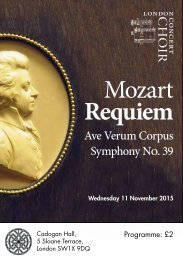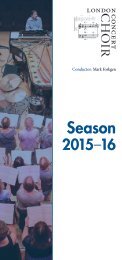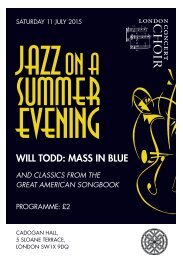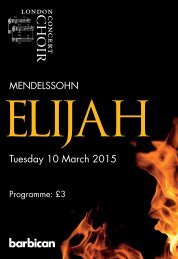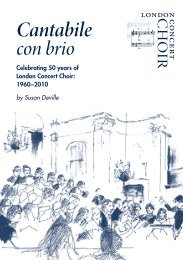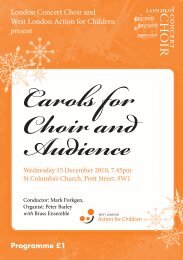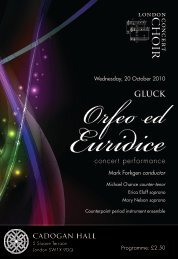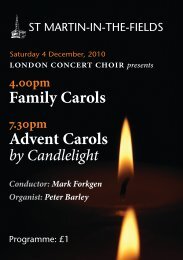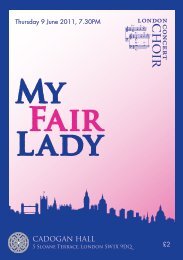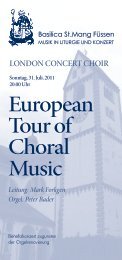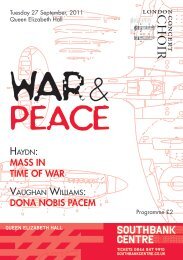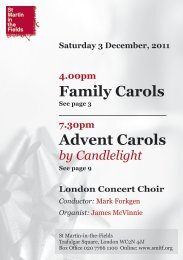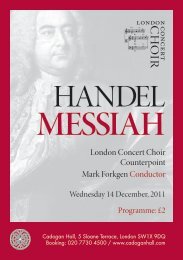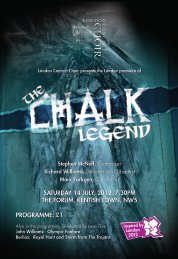You also want an ePaper? Increase the reach of your titles
YUMPU automatically turns print PDFs into web optimized ePapers that Google loves.
TIPPETT<br />
A CHILD OF<br />
OUR TIME<br />
70th Anniversary Performance<br />
BEETHOVEN<br />
SYMPHONY NO.5<br />
MONDAY, <strong>17</strong> MARCH <strong>2014</strong><br />
QUEEN ELIZABETH HALL<br />
PROGRAMME £2
WELCOME TO SOUTHBANK CENTRE<br />
AND WE HOPE YOU ENJOY YOUR VISIT<br />
We have a Duty Manager available at all times.<br />
If you have any queries please ask any member <strong>of</strong> staff for assistance.<br />
During the performance:<br />
• Please ensure that mobile phones, pagers, iPhones and alarms<br />
on digital watches are switched <strong>of</strong>f.<br />
• Please try not to cough until the normal breaks in the music.<br />
• Flash photography and audio or video recording are not permitted.<br />
Eating, drinking and shopping? Southbank Centre shops and restaurants include<br />
Foyles, EAT, Giraffe, Strada, YO! Sushi, wagamama, Le Pain Quotidien, Las<br />
Iguanas, ping pong, Canteen, Caffè Vergnano 1882, Skylon, Concrete, Feng Sushi<br />
and Topolski, as well as cafes, restaurants and shops inside Royal Festival Hall,<br />
Queen Elizabeth Hall and Hayward Gallery.<br />
If you wish to get in touch with us following your visit please contact the Visitor<br />
Experience Team at Southbank Centre, Belvedere Road, London, SE1 8XX,<br />
phone 020 7960 4250, or email customer@southbankcentre.co.uk<br />
We look forward to seeing you again soon.<br />
Beethoven Programme Notes by kind permission <strong>of</strong> Dr Richard E. Rodda<br />
<strong>Tippett</strong> Progamme Notes by Sabine Köllman<br />
Sung text reprinted by permission <strong>of</strong> Schott & Co. Ltd<br />
The unpublished portrait <strong>of</strong> Michael <strong>Tippett</strong> by Milein Cosman is reproduced by<br />
kind permission <strong>of</strong> The Cosman Keller Art and Music Trust.<br />
London Concert Choir would like to thank Mervyn Bryn Jones for kindly<br />
allowing us to reproduce autographs collected at the first performance <strong>of</strong><br />
A <strong>Child</strong> <strong>of</strong> <strong>Our</strong> <strong>Time</strong>, in which his parents both sang.<br />
Programme designed by Stephen Rickett and edited by Eleanor Cowie<br />
London Concert Choir is a company limited by guarantee, incorporated in England with registered<br />
number 3220578 and registered charity number 1057242.<br />
Registered Office: 7 Ildersly Grove, Dulwich, London SE21 8EU
MONDAY, <strong>17</strong> MARCH <strong>2014</strong><br />
QUEEN ELIZABETH HALL<br />
BEETHOVEN<br />
SYMPHONY NO.5<br />
INTERVAL<br />
TIPPETT<br />
A CHILD OF OUR TIME<br />
MARK FORKGEN CONDUCTOR<br />
LONDON CONCERT CHOIR<br />
CITY OF LONDON SINFONIA<br />
ERICA ELOFF SOPRANO<br />
PAMELA HELEN STEPHEN MEZZO SOPRANO<br />
MICHAEL BRACEGIRDLE TENOR<br />
DAVID WILSON-JOHNSON BASS
LUDWIG VAN BEETHOVEN (<strong>17</strong>70-1827)<br />
SYMPHONY NO. 5 IN C MINOR<br />
OP. 67<br />
The Fifth Symphony was first performed in 1808 in a concert which<br />
also included the Sixth Symphony, the aria Ah! perfido, the ‘Gloria’<br />
and ‘Sanctus’ from the Mass in C, the Fourth Piano Concerto, a Piano<br />
Fantasia and the Choral Fantasia for piano, chorus and orchestra!<br />
Surprisingly, for one <strong>of</strong> the most recognisable works in classical music, very little is known<br />
about the Symphony’s creation. The famous remark attributed to Beethoven about the<br />
opening motif representing ‘Fate knocking at the door’ is probably apocryphal, an invention<br />
<strong>of</strong> either Anton Schindler or Ferdinand Ries, two young men, close to the composer in his last<br />
years, who later published their <strong>of</strong>ten-untrustworthy reminiscences <strong>of</strong> him.<br />
The time <strong>of</strong> the creation <strong>of</strong> the Fifth Symphony was one <strong>of</strong> intense activity for Beethoven. The<br />
four years during which the work was composed also saw the completion <strong>of</strong> a rich variety<br />
<strong>of</strong> other works: Piano Sonatas, Op. 53, 54 and 57; Fourth Piano Concerto; Fourth and<br />
Sixth Symphonies; Violin Concerto; the first two versions <strong>of</strong> Fidelio; Rasumovsky Quartets,<br />
Op. 59; Coriolan Overture; Mass in C major, Op. 86; and Cello Sonata No. 3, Op. 69.<br />
As was his practice with almost all <strong>of</strong> his important works, Beethoven revised and rewrote<br />
the Fifth Symphony over a period <strong>of</strong> years.<br />
Beethoven’s remarks about this Symphony are vague and elusive rather than concrete. The<br />
compositional problems he set for himself were abstract, musico-emotional ones that were<br />
little affected by external experiences, and not accessible to translation into mere words. In<br />
one <strong>of</strong> his few comments about the Symphony, he noted that, after the creation <strong>of</strong> the theme,<br />
“begins in my head the working-out in breadth, height, and depth. Since I am aware <strong>of</strong> what<br />
I want, the fundamental idea never leaves me. It mounts, it grows. I see before my mind the<br />
picture in its whole extent, as if in a single grasp.” By ‘picture’ Beethoven meant not a visible<br />
painting, but rather an overview <strong>of</strong> the Symphony, from its tiniest fragmentary component to<br />
the grand sweep <strong>of</strong> its total structure.<br />
So completely did composition occupy Beethoven’s thoughts that he sometimes ignored the<br />
necessities <strong>of</strong> daily life. Concern with his appearance, eating habits, cleanliness, even his<br />
conversation, all gave way before his composing. There are many reports <strong>of</strong> his trooping<br />
the streets and woods <strong>of</strong> Vienna humming, singing, bellowing, penning a scrap <strong>of</strong> melody,<br />
and being, in general, oblivious to the people or places around him. This titanic struggle with<br />
musical tones produced such mighty monuments as the Fifth Symphony. With it, and with the<br />
Third Symphony completed only four years earlier, Beethoven launched music and art into<br />
the world <strong>of</strong> Romanticism.<br />
In the history <strong>of</strong> music, Beethoven stands, Janus-faced, as the great colossus between<br />
two ages and two philosophies. The formal perfection <strong>of</strong> the preceding Classical period
finds its greatest fulfilment in his works, which at the same time contain the roots <strong>of</strong> the<br />
cathartic emotional experience from which grew the art <strong>of</strong> the 19th century. Beethoven<br />
himself evaluated his position as a creator in the following way: “Music is the mediator<br />
between intellectual and sensuous life ... the one incorporeal entrance into the higher world<br />
<strong>of</strong> knowledge which comprehends mankind but which mankind cannot comprehend.” The<br />
Fifth Symphony is indeed such a ‘mediator’. Its message <strong>of</strong> victory through struggle, which<br />
so deeply touches both the heart and the mind, is achieved by a near-perfect balance<br />
<strong>of</strong> musical technique and passionate sentiment unsurpassed in the history <strong>of</strong> music. This<br />
Symphony was the work that won for Beethoven an international renown. Despite a few<br />
early misunderstandings, due undoubtedly to its unprecedented concentration <strong>of</strong> energy,<br />
it caught on very quickly, and was soon recognised as a groundbreaking achievement. Its<br />
popularity has never waned.<br />
Beethoven’s Fifth Symphony, more than any other work in the musical repertory, is the<br />
archetypal example <strong>of</strong> the technique and content <strong>of</strong> the form. Its overall structure is not one<br />
<strong>of</strong> four independent essays linked simply by tonality and style, as in the typical 18th-century<br />
example, but is rather a carefully devised whole in which each <strong>of</strong> the movements serves to<br />
carry the work inexorably toward its end. The progression from minor to major, from dark<br />
to light, from conflict to resolution is at the very heart <strong>of</strong> the ‘meaning’ <strong>of</strong> this Symphony.<br />
The triumphant, victorious nature <strong>of</strong> the final movement as the logical outcome <strong>of</strong> all that<br />
preceded it established a model for the symphonies <strong>of</strong> the Romantic era. The psychological<br />
progression toward the finale – the relentless movement toward a life-affirming close – is<br />
one <strong>of</strong> the most important technical and emotional legacies Beethoven left to his successors.<br />
Schumann, Brahms, Tchaikovsky, Mahler – their symphonies are indebted to this one (and to<br />
the Ninth Symphony, as well) for the concept <strong>of</strong> how such a creation should be structured,<br />
and in what manner it should engage the listener.<br />
The opening gesture is the most famous beginning in all <strong>of</strong> classical music. It establishes the<br />
stormy temper <strong>of</strong> the Allegro by presenting the germinal cell from which the entire movement<br />
grows.<br />
Though it is possible to trace this memorable four-note motif through most <strong>of</strong> the bars <strong>of</strong> the<br />
movement, the esteemed musicologist Sir Donald Tovey pointed out that the power <strong>of</strong> the<br />
music is not contained in this fragment, but rather in the ‘long sentences’ that Beethoven built<br />
from it. The key to appreciating Beethoven’s formal structures lies in being aware <strong>of</strong> the way<br />
in which the music moves constantly from one point <strong>of</strong> arrival to the next, from one sentence<br />
to the next. It is in the careful weighting <strong>of</strong> successive climaxes through harmonic, rhythmic<br />
and instrumental resources that Beethoven created the enormous energy and seeming<br />
inevitability <strong>of</strong> this monumental movement.
The gentler second theme derives from the opening motif, and gives only a brief respite<br />
in the headlong rush that hurtles through the movement. It provides the necessary contrast<br />
while doing nothing to impede the music’s flow. The development section is a paragon <strong>of</strong><br />
cohesion, logic and concision. The recapitulation roars forth after a series <strong>of</strong> breathless<br />
chords that pass from woodwinds to strings and back. The stark hammer-blows <strong>of</strong> the closing<br />
chords bring the movement to its powerful end.<br />
The form <strong>of</strong> the second movement is a set <strong>of</strong> variations on two contrasting themes. The first<br />
theme, presented by violas and cellos, is sweet and lyrical in nature; the second, heard in<br />
horns and trumpets, is heroic. The ensuing variations on the themes alternate to produce a<br />
movement by turns gentle and majestic.<br />
The following Scherzo returns to the tempestuous character <strong>of</strong> the opening movement, as the<br />
four-note motto from the first movement is heard again in a brazen setting led by the horns.<br />
The fughetta, the ‘little fugue,’ <strong>of</strong> the central trio is initiated by the cellos and basses. The<br />
Scherzo returns with the mysterious tread <strong>of</strong> the plucked strings, after which the music wanes<br />
until little more than a heartbeat from the timpani remains. Then begins another accumulation<br />
<strong>of</strong> intensity, first gradually, then more quickly, as a link to the finale, which arrives with a<br />
glorious proclamation, like brilliant sun bursting through sinister clouds.<br />
The finale, set in the triumphant key <strong>of</strong> C major, is jubilant and martial. (Robert Schumann<br />
saw here the influence <strong>of</strong> Étienne-Nicolas Méhul, one <strong>of</strong> the prominent composers <strong>of</strong> the<br />
French Revolution.) The sonata form proceeds apace. At the apex <strong>of</strong> the development,<br />
however, the mysterious end <strong>of</strong> the Scherzo is invoked to serve as the link to the return <strong>of</strong> the<br />
main theme in the recapitulation. It also recalls and compresses the emotional journey <strong>of</strong> the<br />
entire Symphony. The closing pages repeat the cadence chords extensively to discharge the<br />
enormous accumulated energy <strong>of</strong> the work.<br />
Concerning the effect <strong>of</strong> the ‘struggle to victory’ that is symbolised by the structure <strong>of</strong> the Fifth<br />
Symphony, a quote that Beethoven scribbled in a notebook <strong>of</strong> the Archduke Rudolf, one <strong>of</strong><br />
his aristocratic piano and composition students, is pertinent. The composer wrote, “Many<br />
assert that every minor [tonality] piece must end in the minor. On the contrary, I find that ...<br />
the major has a glorious effect. Joy follows sorrow, sunshine – rain. It affects me as if I were<br />
looking up to the silvery glistening <strong>of</strong> the evening star.”<br />
© Dr. Richard E. Rodda<br />
INTERVAL – 20 MINUTES<br />
“...the darkness declares the glory <strong>of</strong> light”<br />
T.S. Eliot
MICHAEL TIPPETT (1905-1998)<br />
A CHILD OF OUR TIME<br />
Oratorio for soloists, chorus and orchestra<br />
with text by the composer<br />
Born in London, Sir Michael <strong>Tippett</strong> led a creative life that spanned<br />
almost a century. His artistic development went hand in hand with an<br />
interest in politics and a strong commitment to social justice. An atheist<br />
since childhood, he flirted briefly with Communism, wrote an anti-war<br />
play in 1935 and was imprisoned for two months in 1943 for his uncompromising pacifist<br />
convictions. The economic crisis <strong>of</strong> the 1930s and the political developments in Europe and<br />
Russia concerned him deeply. He engaged with the miners’ situation in the North <strong>of</strong> England<br />
and composed a piece for chorus and piano called Miners (1935), formed an orchestra <strong>of</strong><br />
unemployed musicians at Morley College in London (whose Director <strong>of</strong> Music he became<br />
in 1940) and planned to write an opera based on the 1916 Easter Rising in Dublin. But his<br />
intention to voice his concerns in music and compose a dramatic work dealing with ‘man’s<br />
inhumanity to man’ took a different turn through more immediate world events.<br />
<strong>Tippett</strong>’s sympathies had always been with the deprived and the downtrodden, but also<br />
with those ‘outside the ruling conventions’, as he put it himself. As a pacifist, atheist<br />
and homosexual whose relationship with the painter Wilfred Franks ended tragically<br />
in 1938, he responded strongly to the developments which had turned Europe’s Jewish<br />
population from outsiders to outcasts. In November 1938, Herschel Grynszpan, a<br />
<strong>17</strong>-year-old Polish Jew who was living illegally with relatives in Paris, shot a diplomat<br />
at the German Embassy out <strong>of</strong> desperation about the treatment <strong>of</strong> his parents at<br />
the Polish border and frustration at his own failure to gain the necessary papers to escape<br />
persecution. The <strong>of</strong>ficial, Ernst vom Rath, died two days later, giving the Nazis a pretext<br />
to unleash a terrible progrom against the Jews in Germany: the infamous Kristallnacht<br />
(Night <strong>of</strong> Broken Glass).<br />
Deeply shaken by these events, <strong>Tippett</strong> responded by drafting a musical work which would<br />
reflect not only the specific deed <strong>of</strong> a desperate young man and its horrific consequences<br />
but also the human condition in general, with its conflict between good and evil, light<br />
and shadow, hope and despair. This understanding <strong>of</strong> human life in dialectical terms was<br />
shaped by the Jungian psychoanalysis which <strong>Tippett</strong> had undertaken after his break-up<br />
with Franks, and C.G. Jung’s conviction that the dark side <strong>of</strong> humanity must be addressed<br />
and integrated in order to achieve wholeness and healing informed the overall scheme <strong>of</strong><br />
A <strong>Child</strong> <strong>of</strong> <strong>Our</strong> <strong>Time</strong>.<br />
The title derives from a novel by the Austro-Hungarian writer Ödön von Horváth, whose work<br />
Ein Kind unserer Zeit was published in 1938. It tells the story <strong>of</strong> a young German soldier<br />
and convinced Nazi who becomes disillusioned by the reality behind the ideology. He<br />
commits a senseless murder out <strong>of</strong> sheer disgust, but refuses to admit personal guilt. Lonely<br />
and desperate, he freezes to death in a snowstorm. The novel’s leitmotif <strong>of</strong> the growing cold<br />
may have influenced <strong>Tippett</strong>’s recurring imagery <strong>of</strong> wintry ice and cold as a symbol <strong>of</strong><br />
desolation and despair.
<strong>Tippett</strong>, who was deeply embedded in the traditions <strong>of</strong> European music, decided that his<br />
work should take the form <strong>of</strong> an oratorio with a tripartite structure modelled on that <strong>of</strong><br />
Handel’s Messiah. In an outline <strong>of</strong> the work that he sent to his friend, the poet T.S. Eliot whom<br />
he had asked to help with the libretto, he set out his ‘sketch for a modern oratorio’:<br />
Part I deals only with the general state <strong>of</strong> affairs in the world today as it affects all individuals,<br />
minorities, classes or races who are felt to be outside the ruling conventions – Man at odds with<br />
his Shadow.<br />
In Part II appears the <strong>Child</strong> <strong>of</strong> our <strong>Time</strong>, enmeshed in the drama <strong>of</strong> his personal fate and in the<br />
elemental social forces <strong>of</strong> our day. The drama is due to the fact that the forces which drive the<br />
young man prove stronger than the good advice <strong>of</strong> his uncle and aunt – as it always was and<br />
always will be.<br />
Part III is concerned with the significance <strong>of</strong> this drama and the possible healing that would come<br />
from Man’s acceptance <strong>of</strong> his Shadow in relation to his Light.<br />
In accordance with his intention to give universal significance to the specific details<br />
<strong>Tippett</strong> avoids proper names. Instead, he gives roles to ‘the Boy’,‘the Mother’, ‘the Aunt’,<br />
‘the Uncle’, ‘the Persecuted’ and ‘the Persecutors’ in Part II, and speaks in general terms <strong>of</strong><br />
‘the dark forces’, ‘the oppressed’, ‘the scapegoat’ and ‘the child <strong>of</strong> our time’, ‘the <strong>of</strong>ficial’ and<br />
‘the man <strong>of</strong> destiny’. Having considered <strong>Tippett</strong>’s detailed outline for the oratorio, Eliot<br />
advised the composer to write the text himself – advice that <strong>Tippett</strong> followed not only for this<br />
but for all future works.<br />
<strong>Tippett</strong> began composing the music for A <strong>Child</strong> <strong>of</strong> <strong>Our</strong> <strong>Time</strong> in 1939. Apart from Handel’s<br />
Messiah the most important influence on the work is that <strong>of</strong> Bach’s Passions. The story is told<br />
by a narrator (here a bass) in recitative, while the soloists and chorus comment and reflect on<br />
the events, or become part <strong>of</strong> the dramatic representation. This is, for example, the case in<br />
Part II, No. 11, the Double Chorus <strong>of</strong> Persecutors and Persecuted, where the shouts <strong>of</strong> ‘Away<br />
with them!’ from Choir I are answered by the anguished cries <strong>of</strong> Choir II ‘Where, where?’ –<br />
a clear parallel to the double chorus in Bach’s St Matthew Passion with its question ‘Wohin?<br />
wohin?’. Another parallel to Bach and his chilling setting <strong>of</strong> the chorus ‘Crucify him!’ is the<br />
mob in <strong>Tippett</strong>’s work demanding ‘Curse them! Kill them!’. The fact that the Jews are the<br />
persecutors in the older work and the persecuted in the modern underlines <strong>Tippett</strong>’s idea <strong>of</strong><br />
the ‘chaotic mirror’ (Part I, No. 2) in which it appears as if evil is good and reason untrue.<br />
The roles <strong>of</strong> victim and perpetrator may be reversed over time. But it is ‘pity that breaks open<br />
the heart’ – a heartfelt appeal for human compassion, sung by the Alto soloist in answer to<br />
the anguished, discordant questioning <strong>of</strong> the chorus, ‘Is evil then good?’ (Part I, No. 3).<br />
<strong>Tippett</strong>’s biggest challenge was to find an equivalent for the Lutheran chorales in the Bach<br />
Passions. He did not want to include Protestant hymns for the audience, as Britten did a<br />
few years later, nor did he want to use Jewish songs, as this would have narrowed the<br />
universal appeal that he intended for his work. He found what he was looking for – the<br />
simple, immediate expression <strong>of</strong> sentiment in popular song – in a collection <strong>of</strong> spirituals he<br />
obtained from America. He used five <strong>of</strong> these moving songs <strong>of</strong> oppression, <strong>of</strong> sorrow, anger<br />
and hope as points <strong>of</strong> rest in the oratorio, conveying a communal feeling in the same way<br />
as Bach’s congregational chorales. <strong>Tippett</strong> insisted that the spirituals should not be oversentimentalised,<br />
but sung with a strong underlying pulse and slightly ‘swung’.
Charcoal portrait <strong>of</strong> Michael <strong>Tippett</strong> by<br />
Milein Cosman (born 1921); early 1950s<br />
Having moulded the spirituals to his requirements, <strong>Tippett</strong> then realised that his own music<br />
would need to contain some <strong>of</strong> their rhythmic and harmonic features. He integrates elements<br />
<strong>of</strong> jazz such as chromaticism and syncopation, incorporates Blues intervals and other popular<br />
musical forms such as the tango rhythm which underlies the tenor solo ‘I have no money<br />
for my bread’ (Part I, No. 6).The double-chorus settings not only reflect Bach’s Passions but<br />
also the call-and-response pattern <strong>of</strong> Gospel music. This is also referenced in the dialogue<br />
between soloists and choir where, for example in Part I, No. 7, the anxious questions <strong>of</strong> the<br />
mother, sung by the soprano, about the future <strong>of</strong> her family are answered by the choir in
No. 8 with the calming spiritual ‘Steal away’. In a reversal <strong>of</strong> roles, in Part III, No. 28, it is<br />
the bass soloist who provides the answers to the choir’s urgent plea for guidance, ‘How shall<br />
we have patience...?’, with his almost Wagnerian monologue ‘The words <strong>of</strong> wisdom are<br />
these’, set over a strong underlay <strong>of</strong> magisterial brass.<br />
<strong>Tippett</strong> creates a remarkable correspondence between content and form in his oratorio.<br />
From the opening <strong>of</strong> the work, when menacing brass cords are followed by expressive string<br />
writing, the musical language reflects the duality <strong>of</strong> shadow and light found in the libretto.<br />
Disturbing evocations <strong>of</strong> darkness and distress in challenging harmonies and angular musical<br />
lines are contrasted with more melodic, ethereal music, as in the two contemplative interludes<br />
near the beginning and the end <strong>of</strong> the work. The recurrent use <strong>of</strong> <strong>of</strong>f-beat rhythms and<br />
writing across bar-lines creates a deliberately disconcerting, unsettling effect, for instance<br />
in the Chorus <strong>of</strong> the Oppressed ‘When shall the usurers‘ city cease?‘ (Part I, No. 5) and<br />
the Mother’s aria ‘What have I done to you, my son?’ (Part II, No. 23), where the rhythms<br />
express her disordered thoughts. In stark contrast is the deliberately crude musical language<br />
<strong>of</strong> the Chorus <strong>of</strong> the Self-righteous (Part II, No. 13).<br />
<strong>Tippett</strong> frequently ends movements with the chord <strong>of</strong> an open fifth, leaving the tonality<br />
unresolved, thus evoking a disconcerting world without certainties. The most intense writing<br />
occurs in Part III and the difficult resolution he <strong>of</strong>fers at the end (No. 29), ‘I would know my<br />
shadow and my light’, is set to a funeral march. Here, chorus and soloists all come together,<br />
ending the oratorio in the expression <strong>of</strong> hope for peace in the spiritual ‘Deep River’.<br />
The message that <strong>Tippett</strong> conveys is not a simple one. He does not ask for a condemnation<br />
<strong>of</strong> hatred and evil, but for a recognition that the dark side is a part <strong>of</strong> human nature that<br />
must not be denied and projected onto a scapegoat. Only by recognising shadow/evil<br />
and consciously dealing with it can there be light and goodness. It is a message <strong>of</strong> hope,<br />
embedded in a cosmic vision <strong>of</strong> the world which turns from the threatening dark, icy cold <strong>of</strong><br />
winter – musically expressed by the interval <strong>of</strong> a descending minor sixth (Part I, No. 1) – to<br />
the returning light and renewing warmth <strong>of</strong> spring, represented in an ascending major sixth<br />
(Part III, No. 29).<br />
<strong>Tippett</strong> finished his oratorio in 1941, but A <strong>Child</strong> <strong>of</strong> <strong>Our</strong> <strong>Time</strong> was not performed until 1944,<br />
when, with the support <strong>of</strong> Benjamin Britten, the premiere took place at London’s Adelphi<br />
Theatre almost exactly 70 years ago, on 19 <strong>March</strong>. The London Philharmonic Orchestra<br />
performed under the baton <strong>of</strong> Walter Goehr, with soloists Joan Cross (soprano), Margaret<br />
MacArthur (alto), Peter Pears (tenor) and Roderick Lloyd (bass).<br />
Early reviews were mostly favourable. Writing in The Observer, William Glock called the<br />
oratorio ‘The most moving and important work by an English composer for many years’.<br />
He found that the spirituals were perfectly suited to the themes <strong>of</strong> the oratorio and had been<br />
arranged ‘with a pr<strong>of</strong>ound sense <strong>of</strong> beauty’. A <strong>Child</strong> <strong>of</strong> <strong>Our</strong> <strong>Time</strong> placed <strong>Tippett</strong> in the first<br />
rank <strong>of</strong> the composers <strong>of</strong> his generation. 70 years after its premiere the work still speaks to<br />
us as pr<strong>of</strong>oundly as it did then.
TEXT OF THE ORATORIO<br />
PART I<br />
1. Chorus<br />
The world turns on its dark side.<br />
It is winter.<br />
2. The Argument: Alto Solo<br />
Man has measured the heavens with a<br />
telescope, driven the Gods from their thrones.<br />
But the soul, watching the chaotic mirror,<br />
knows that the Gods return.<br />
Truly, the living God consumes within<br />
and turns the flesh to cancer!<br />
Interludium<br />
Orchestra, leading to<br />
3. Scena: Chorus and Alto Solo<br />
Chorus<br />
Is evil then good?<br />
Is reason untrue?<br />
Alto<br />
Reason is true to itself;<br />
But pity breaks open the heart.<br />
Chorus<br />
We are lost.<br />
We are as seed before the wind.<br />
We are carried to a great slaughter.<br />
4. The Narrator: Bass Solo<br />
Now in each nation there<br />
were some cast out<br />
by authority and tormented,<br />
made to suffer for the general wrong.<br />
Pogroms in the east, lynching in the west:<br />
Europe brooding on a war <strong>of</strong> starvation.<br />
And a great cry went up from the people:<br />
5. Chorus <strong>of</strong> the Oppressed<br />
When shall the usurers’ city cease,<br />
And famine depart from the fruitful land?<br />
6. Tenor Solo<br />
I have no money for my bread;<br />
I have no gift for my love.<br />
I am caught between my desires<br />
and their frustration<br />
as between the hammer and the anvil.<br />
How can I grow to a man’s stature?<br />
7. Soprano Solo<br />
How can I cherish my man in such days,<br />
or become a mother in a world <strong>of</strong><br />
destruction?<br />
How shall I feed my children<br />
on so small a wage?<br />
How can I comfort them when I am dead?<br />
8. A Spritual: Chorus and Soloists<br />
Steal away, steal away, steal away to Jesus;<br />
Steal away, steal away home –<br />
I han’t got long to stay here.<br />
My Lord, He calls me,<br />
He calls me by the thunder,<br />
The trumpet sounds within-a my soul,<br />
I han’t got long to stay here.<br />
Green trees a-bending,<br />
poor sinner stand a-trembling,<br />
The trumpet sounds within-a my soul,<br />
I han’t got long to stay here.<br />
Steal away, steal away, steal away to Jesus;<br />
Steal away, steal away home –<br />
I han’t got long to stay here.<br />
PART II<br />
9. Chorus<br />
A star rises in mid-winter.<br />
Behold the man! The scapegoat!<br />
The child <strong>of</strong> our time.<br />
10. The Narrator: Bass Solo<br />
And a time came when in the continual<br />
persecution one race stood for all.<br />
11. Double Chorus <strong>of</strong> Persecutors<br />
and Persecuted<br />
Away with them! Where?<br />
Curse them! Kill them! Why?<br />
They infect the state. How?<br />
We have no refuge.
12. The Narrator: Bass Solo<br />
Where they could, they fled from the terror.<br />
And among them a boy escaped secretly,<br />
and was kept in hiding in a great city.<br />
13. Chorus <strong>of</strong> the Self-righteous<br />
We cannot have them in our Empire.<br />
They shall not work, nor draw a dole.<br />
Let them starve in No-Man’s-Land!<br />
14. The Narrator: Bass Solo<br />
And the boy’s mother wrote a letter, saying:<br />
15. Scena: Solo Quartet<br />
Mother: Soprano<br />
O my son! In the dread terror they have<br />
brought me near to death.<br />
Boy: Tenor<br />
Mother! Ah Mother!<br />
Though men hunt me like an animal,<br />
I will defy the world to reach you.<br />
Aunt: Alto<br />
Have patience.<br />
Throw not your life away in futile sacrifice.<br />
Uncle: Bass<br />
You are as one against all.<br />
Accept the impotence <strong>of</strong> your humanity.<br />
Boy<br />
No! I must save her.<br />
16. A Spiritual: Chorus and Soloists<br />
Nobody knows the trouble I see, Lord,<br />
Nobody knows like Jesus.<br />
O brothers, pray for me,<br />
And help me to drive Old Satan away.<br />
O mothers, pray for me,<br />
And help me to drive Old Satan away.<br />
Nobody knows the trouble I see, Lord,<br />
Nobody knows like Jesus.<br />
<strong>17</strong>. Scena: Duet - Bass and Alto<br />
Bass<br />
The boy becomes desperate in his agony.<br />
Alto<br />
A curse is born.<br />
The dark forces threaten him.<br />
Bass<br />
He goes to authority.<br />
He is met with hostility.<br />
Alto<br />
His other self rises in him,<br />
demonic and destructive.<br />
Bass<br />
He shoots the <strong>of</strong>ficial –<br />
Alto<br />
But he shoots only his dark brother –<br />
And see – he is dead.<br />
18. The Narrator: Bass Solo<br />
They took a terrible vengeance.<br />
19. The Terror: Chorus<br />
Burn down their houses!<br />
Beat in their heads!<br />
Break them in pieces on the wheel!<br />
20. The Narrator: Bass Solo<br />
Men were ashamed <strong>of</strong> what was done.<br />
There was bitterness and horror.<br />
21. A Spiritual <strong>of</strong> Anger:<br />
Chorus and Bass Solo<br />
Go down, Moses, way down in Egypt land;<br />
Tell old Pharaoh, to let my people go.<br />
When Israel was in Egypt land,<br />
Let my people go,<br />
Oppressed so hard they could not stand,<br />
Let my people go,<br />
“Thus spake the Lord,” bold Moses said,<br />
Let my people go,<br />
“If not, I’ll smite your first-born dead,”<br />
Let my people go.<br />
Go down, Moses, way down in Egypt land;<br />
Tell old Pharaoh, to let my people go.<br />
22. The Boy sings in his Prison:<br />
Tenor Solo<br />
My dreams are all shattered<br />
in a ghastly reality.<br />
The wild beating <strong>of</strong> my heart is stilled:<br />
day by day.<br />
Earth and sky are not for those in prison.<br />
Mother! Mother!<br />
23. The Mother: Soprano Solo<br />
What have I done to you, my son?<br />
What will become <strong>of</strong> us now?<br />
The springs <strong>of</strong> hope are dried up.<br />
My heart aches in unending pain.
24. Alto Solo<br />
The dark forces rise like a flood.<br />
Men’s hearts are heavy: they cry for peace.<br />
25. A Spiritual:<br />
Chorus and Soprano Solo<br />
O, by and by, by and by,<br />
I’m going to lay down my heavy load.<br />
I know my robe’s going to fit me well,<br />
I tried it on at the gates <strong>of</strong> hell.<br />
O, hell is deep and a dark despair,<br />
O, stop, poor sinner, and don’t go there!<br />
O, by and by, by and by,<br />
I’m going to lay down my heavy load.<br />
PART III<br />
26. Chorus<br />
The cold deepens.<br />
The world descends into the icy waters<br />
where lies the jewel <strong>of</strong> great price.<br />
27. Alto Solo<br />
The soul <strong>of</strong> man is impassioned<br />
like a woman.<br />
She is old as the earth,<br />
beyond good and evil,<br />
the sensual garments.<br />
Her face will be illumined like the sun.<br />
Then is the time <strong>of</strong> his deliverance.<br />
28. Scena: Bass Solo and Chorus<br />
Bass Solo<br />
The words <strong>of</strong> wisdom are these:<br />
Winter cold means inner warmth,<br />
the secret nursery <strong>of</strong> the seed.<br />
Chorus<br />
How shall we have patience<br />
for the consummation <strong>of</strong> the mystery?<br />
Who will comfort us in the going through?<br />
Bass<br />
Patience is born in the tension <strong>of</strong> loneliness.<br />
The garden lies beyond the desert.<br />
Chorus<br />
Is the man <strong>of</strong> destiny master <strong>of</strong> us all?<br />
Shall those cast out be unavenged?<br />
Bass<br />
The man <strong>of</strong> destiny is cut <strong>of</strong>f from fellowship.<br />
Healing springs from the womb <strong>of</strong> time.<br />
The simple-hearted shall exult in the end.<br />
Chorus<br />
What <strong>of</strong> the boy, then? What <strong>of</strong> him?<br />
Bass<br />
He, too, is outcast,<br />
his manhood broken in the clash <strong>of</strong> powers.<br />
God overpowered him –<br />
the child <strong>of</strong> our time.<br />
Preludium<br />
Orchestra, leading to<br />
29. General Ensemble:<br />
Chorus and Soloists<br />
Tenor<br />
I would know my shadow and my light,<br />
so shall I at last be whole.<br />
Bass<br />
Then courage, brother,<br />
dare the grave passage.<br />
Soprano<br />
Here is no final grieving,<br />
but an abiding hope.<br />
Alto<br />
The moving waters renew the earth.<br />
It is spring.<br />
The Chorus repeats the words <strong>of</strong> the soloists.<br />
The soloists then continue with wordless<br />
vocalisation, leading to<br />
30. A Spiritual: Chorus and Soloists<br />
Deep river, my home is over Jordan,<br />
Deep river, Lord,<br />
I want to cross over into camp-ground.<br />
O, chillun! O, don’t you want to go,<br />
To that gospel feast,<br />
That promised land,<br />
That land where all is peace?<br />
Walk into heaven, and take my seat,<br />
And cast my crown at Jesus’ feet.<br />
Deep river, my home is over Jordan,<br />
I want to cross over into camp-ground, Lord!
MARK FORKGEN<br />
CONDUCTOR<br />
Mark Forkgen has been Music Director <strong>of</strong> London Concert Choir<br />
since 1996. He is also Music Director <strong>of</strong> Canticum chamber choir,<br />
Principal Conductor and Artistic Advisor <strong>of</strong> Kokoro (the Bournemouth<br />
Symphony Orchestra’s New Music Group) and Director <strong>of</strong> Music<br />
at Tonbridge School. He has conducted major UK orchestras,<br />
including the Royal Philharmonic Orchestra, Orchestra <strong>of</strong> the Age<br />
<strong>of</strong> Enlightenment, Bournemouth Symphony Orchestra, City <strong>of</strong> London<br />
Sinfonia, English Chamber Orchestra, English Northern Philharmonia and Manchester<br />
Camerata, appearing at major venues, including Royal Festival Hall, Barbican Hall and<br />
Royal Albert Hall.<br />
A specialist in the field <strong>of</strong> choral and contemporary music, Mark has given the first<br />
performances <strong>of</strong> more than 100 works. He has also conducted stage works with the Trestle<br />
Theatre Company and Britten Sinfonia, and contemporary opera with the Unicorn Theatre<br />
Company and an ensemble from the Philharmonia, at the Linbury Studio, Royal Opera<br />
House, Covent Garden.<br />
Mark’s wide range <strong>of</strong> conducting also includes performances with Deep Purple for the Henley<br />
Festival and recreating Pink Floyd’s Atom Heart Mother in the Chelsea Festival. He has been<br />
Conductor and Artistic Advisor for highly acclaimed festivals including: Sir Peter Maxwell<br />
Davies’ 70th Birthday; Stravinsky, ‘A Festival <strong>of</strong> Britten’, ‘Music <strong>of</strong> the Americas’, ‘Britain<br />
since Britten’ and ‘East meets West’. In Europe he has conducted in Denmark (performances<br />
<strong>of</strong> Stravinsky’s The Rite <strong>of</strong> Spring), Spain, France, Belgium, Germany, Holland, Eire, the<br />
Czech Republic and Italy (including Handel’s Messiah in Sienna and Israel in Egypt at the<br />
Viterbo Early Music Festival).<br />
Last season’s highlights included a production <strong>of</strong> Weill’s Threepenny Opera, a concert at the<br />
Royal Albert Hall involving 1500 performers and performances in Hong Kong and Bulgaria.<br />
This season’s have included Jonathan Lloyd’s score to Hitchcock’s Blackmail, performed with<br />
the film, concerts celebrating Britten’s centenary, a highly acclaimed Shakespeare project<br />
and performances <strong>of</strong> Messiaen’s Quartet for the End <strong>of</strong> <strong>Time</strong> as a pianist.
LONDON CONCERT CHOIR<br />
London Concert Choir, founded as the Brompton Choral<br />
Society in 1960, now has around 150 members <strong>of</strong> a wide<br />
range <strong>of</strong> ages and is notable for its unusually broad musical<br />
repertoire. With Music Director Mark Forkgen the choir<br />
regularly appears at all the major London concert venues<br />
and in cathedrals and churches in and around the capital,<br />
as well as touring to European destinations. In 2011 a<br />
performance <strong>of</strong> Verdi’s Requiem with the Augsburg Basilica<br />
Choir in Royal Festival Hall was followed by a joint concert<br />
at the Augsburg Peace Festival. The choir will tour to Italy in<br />
July <strong>2014</strong>, to perform in Assisi, Gubbio and Orvieto.<br />
To celebrate its 50th anniversary in 2010 the choir sang<br />
Britten’s War Requiem at the Barbican with Southbank<br />
Sinfonia and in Salisbury Cathedral with Dorset Youth<br />
Orchestra. Since then Southbank Sinfonia have joined with<br />
LCC in Elgar’s Dream <strong>of</strong> Gerontius at Royal Festival Hall,<br />
and for an exhilarating concert <strong>of</strong> French music at<br />
the Barbican. Major works in earlier seasons include<br />
Beethoven’s Missa Solemnis with the English Chamber<br />
Orchestra and Vaughan Williams’ Sea Symphony with the<br />
Royal Philharmonic Orchestra.<br />
On a smaller scale, LCC has sung rarely-heard settings<br />
<strong>of</strong> the Russian Orthodox liturgy and Rossini’s Petite Messe<br />
Solennelle. Performances with Counterpoint include<br />
Handel’s Messiah and Bach’s St Matthew Passion and<br />
Christmas Oratorio.<br />
In July 2012 LCC was joined by the Kokoro ensemble, youth<br />
orchestras and choirs from local schools for the London<br />
premiere <strong>of</strong> Stephen McNeff’s opera-oratorio The Chalk<br />
Legend. Concert performances <strong>of</strong> operas and musicals<br />
have included Gluck’s Orfeo, Purcell’s Dido and Aeneas,<br />
Gershwin’s Porgy and Bess and Lerner and Loewe’s My Fair<br />
Lady. The choir <strong>of</strong>ten gives concerts for charity and has<br />
commissioned a number <strong>of</strong> new works.<br />
www.london-concert-choir.org.uk<br />
Mark Forkgen<br />
Music Director<br />
James Longford<br />
Principal Accompanist<br />
Fabyan Evans<br />
Chairman<br />
Tim Thirlway<br />
Concert Manager<br />
Barbara Whent<br />
Treasurer<br />
Stephen Rickett<br />
Design and<br />
Communications<br />
Jennifer Greenway<br />
Membership<br />
Eleanor Cowie<br />
Publicity<br />
Simon Livesey<br />
Company Secretary
ERICA ELOFF<br />
SOPRANO<br />
Over the last ten years, soprano Erica El<strong>of</strong>f has steadily built her<br />
career on the concert platform to become a sought-after soloist and<br />
recitalist. Praised in the media for her vocal authority and technical<br />
control, and a voice that is bright and well-produced across its<br />
range with great power at the top, she is a passionate and deeply<br />
musical performer. Erica is delighted to join London Concert Choir<br />
for tonight’s performance <strong>of</strong> <strong>Tippett</strong>’s A <strong>Child</strong> <strong>of</strong> <strong>Our</strong> <strong>Time</strong>.<br />
Erica’s wide-ranging repertoire includes all <strong>of</strong> the major choral compositions including<br />
several lesser-known works. As an active chamber musician and passionate performer <strong>of</strong><br />
Lieder, Erica has presented world premiers <strong>of</strong> works by American, Argentinian, English and<br />
South African composers, including works specifically written for her by composers James<br />
Wilding and Hannes Taljaard.<br />
As winner <strong>of</strong> the London Handel Singing Competition, Erica has had the privilege <strong>of</strong><br />
collaborating with Laurence Cummings and the London Handel Players on several<br />
occasions, including performing Handel’s Messiah at St. George’s, Hanover Square. Her<br />
operatic experience includes the roles <strong>of</strong> Meleagro (Atalanta), Fiordiligi and Despina (Cosi<br />
fan tutte), First Lady and the Queen <strong>of</strong> the Night (Die Zauberflöte), Violetta (La Traviata),<br />
Tatyana (Eugene Onegin), Kate Pinkerton (Madama Butterfly), Belinda (Dido and Aeneas),<br />
Adèle (Die Fledermaus) and Adina (L’elisir d’amore).<br />
Looking ahead, Erica’s future engagements include opera, concerts and recitals throughout<br />
England, Europe and South Africa. This year she will also be making her debut in Argentina<br />
in a new opera written for her by the composer Augusto Arias.<br />
When not occupying herself with music and all things musical, Erica runs a busy family<br />
shuttle service, and spends a lot <strong>of</strong> time cooking and listening to her children singing,<br />
rhyming or relaying all sorts <strong>of</strong> random facts.
PAMELA HELEN STEPHEN<br />
MEZZO SOPRANO<br />
Pamela Helen Stephen studied at the Royal Scottish Academy<br />
<strong>of</strong> Music and Drama, at the Opera Theater Center at Aspen,<br />
Colorado with Herta Glaz, and in Toronto with Patricia Kern.<br />
Highly regarded as a versatile singer and a vivid actress, she has<br />
performed with Royal Opera, Covent Garden, English and Welsh<br />
National Operas, Opera North, Lyric Theatre Singapore, Los Angeles<br />
Opera; at the Spoleto, Batignano, Edinburgh, Aldeburgh, City <strong>of</strong> London, Cheltenham, St.<br />
Endellion and Wexford Festivals, and in Lisbon, Ludwigsburg, Paris, Tokyo, Vienna, The<br />
Hague and Amsterdam. Pamela Helen Stephen’s close association with Opera Australia<br />
saw her perform many roles there including Sesto (Giulio Cesare), Nicklausse/Muse (Les<br />
Contes d’H<strong>of</strong>fman) and the title role in Carmen.<br />
Pamela Helen Stephen has appeared with the London Symphony, Bournemouth Symphony,<br />
City <strong>of</strong> Birmingham Symphony, Scottish Chamber, Royal Scottish National, Seattle Symphony<br />
and Prague Symphony Orchestras, City <strong>of</strong> London Sinfonia, BBC National Orchestra<br />
Wales, Northern Sinfonia, Rundfunk-Sinfonieorchester, Berlin, Bamberger Symphoniker, and<br />
Orchestra Sinfonica di Milano.<br />
She has made over 30 recordings including Phoebe (The Yeomen <strong>of</strong> the Guard - Mackerras),<br />
Cherubino (Le Nozze di Figaro - Gardiner), <strong>Child</strong> (L’enfant et les Sortilèges - Previn), Second<br />
Niece (Peter Grimes), Sonya (War and Peace), Desideria (The Saint <strong>of</strong> Bleecker Street), Nancy<br />
(Albert Herring), Angelica (A Poisoned Kiss), Kate (Owen Wingrave); and several Haydn<br />
Masses with Collegium Musicum 90 (all with Hickox), and most recently Ariadne auf Naxos<br />
and Szymanowski’s Stabat Mater with Edward Gardner for Chandos.<br />
Recent and future highlights include Delius A Mass <strong>of</strong> Life at the Edinburgh International<br />
Festival with Sir Andrew Davis, <strong>Tippett</strong> A <strong>Child</strong> <strong>of</strong> <strong>Our</strong> <strong>Time</strong> under Ryan Wigglesworth and a<br />
concert performance <strong>of</strong> the role <strong>of</strong> Auntie (Peter Grimes) under Vladimir Jurowski, both with<br />
the LPO; Suzuki (Madame Butterfly), Mrs Disney (The Perfect American), and Emilia (Otello)<br />
for English National Opera, Hecuba in Les Troyens for the Royal Opera House, Covent<br />
Garden, the title roles in Giulio Cesare and Dido and Aeneas for Opera North, Annina<br />
(Der Rosenkavalier) with the City <strong>of</strong> Birmingham Symphony Orchestra conducted by Andris<br />
Nelsons, and Orl<strong>of</strong>sky (Die Fledermaus) with the Philharmonia conducted by John Wilson.
MICHAEL BRACEGIRDLE<br />
TENOR<br />
Winner <strong>of</strong> the Emmy Destinn Award for Young Singers and a<br />
graduate <strong>of</strong> Durham University, Michael Bracegirdle first qualified as<br />
a Chartered Accountant and went on to work as a Finance Director<br />
in industry. In 2003 he gave up his business career to further his<br />
vocal studies at the Royal Northern College <strong>of</strong> Music.<br />
As a prize winner at the Opera Competition and Festival with Mezzo<br />
Television, Hungary, he made his New York opera début as Judge Danforth in The Crucible<br />
with Dicapo Opera Theatre, a performance he repeated at the National Theatre, Szeged.<br />
Having made his English National Opera début in the role <strong>of</strong> First Armed Man in The<br />
Magic Flute, Michael Bracegirdle has since returned as Tamino and has appeared as Fourth<br />
Esquire in Parsifal whilst also covering the title role. With Opéra de Limoges he appeared as<br />
Le Prince in L’amour des trois oranges.<br />
Michael Bracegirdle’s repertoire also includes Erik (Der Fliegende Holländer), Loge (Das<br />
Rheingold), Steva (Jenůfa), Jenik (The Bartered Bride), Lensky (Eugene Onegin), Boris and<br />
Kudryash (Katya Kabanova), Cavaradossi (Tosca), Rodolfo (La bohème), Ruggero (La rondine)<br />
and Lysander (A Midsummer Night’s Dream). In concert with the Chelsea Opera Group<br />
he sang Jason in Medée and Malcolm in Macbeth. He has worked with Clonter Opera,<br />
Opera Holland Park, Scottish Opera on Tour, Mid Wales Opera, English Touring Opera and<br />
Longborough Festival Opera.<br />
Michael Bracegirdle has a busy concert diary and his engagements have included Puccini’s<br />
Messa di Gloria and Rossini’s Stabat Mater with the Huddersfield Choral Society, Beethoven’s<br />
Missa Solemnis at The Barbican, as well as appearances with the Royal Liverpool Philharmonic<br />
Orchestra, the Royal Philharmonic Orchestra and the RTÉ National Symphony Orchestra.<br />
He has broadcast on BBC Radio 3 and Radio 4.<br />
Current and recent engagements include Neil Hannon’s Sevastopol for ROH2, Laca (Jenůfa)<br />
for Opéra de Rennes, Limoges and Reims; Boris (Katya Kabanova) at Longborough Festival<br />
Opera, the title role in Les Contes D’H<strong>of</strong>fmann with Diva Opera and the Verdi Requiem with<br />
the Brighton Philharmonic Orchestra.
DAVID WILSON-JOHNSON<br />
BASS<br />
The British baritone David Wilson-Johnson studied Modern<br />
Languages at St Catharine’s College, Cambridge and singing at the<br />
Royal Academy <strong>of</strong> Music in London. Over a career spanning forty<br />
years he has been a guest <strong>of</strong> the major opera houses and orchestras<br />
and festivals worldwide. He has sung under many distinguished<br />
conductors including Boulez, Brüggen, Bychkov, Davis, Dutoit,<br />
Giulini, Harnoncourt, Herreweghe, Knussen, Leonhardt, Mackerras,<br />
Mehta, Previn, Rattle and Rozhdestvensky.<br />
His recordings range from Tubular Bells and Ommadawn (Mike Oldfield), the film ‘Give<br />
my regards to Broad Street’ (The Beatles) to works <strong>of</strong> Bach (Leonhardt, Giulini) Beethoven<br />
(Mackerras), Mahler 8 (Berlin Philharmonic/Rattle) Stravinsky, Schoenberg (Boulez, Knussen,<br />
Robert Craft), Ravel (Previn), Frank Martin’s Jedermann Monologues (LPO/Bamert) and with<br />
his regular pianist partner David Owen Norris a ground breaking Winterreise and songs by<br />
Finzi, Quilter, Somervell and Trevor Hold.<br />
Notable operatic appearances include the title roles in <strong>Tippett</strong>’s King Priam (Nationale<br />
Reisopera and BBC Proms), Albeniz’s Merlin (Teatro Real Madrid), Shostakovich’s The<br />
Nose under Gennadi Rozhdestvensky (Netherlands Opera), and Messiaen’s Saint François<br />
d’Assise (London, Lyon, Amsterdam, Brussels, New York and Edinburgh Festival).<br />
Recent and future highlights include Mahler Symphony No. 8 (Berlin Philharmonic/Rattle, and<br />
also Beijing Festival Orchestra/Dutoit), A <strong>Child</strong> <strong>of</strong> <strong>Our</strong> <strong>Time</strong> (Royal Philharmonic Orchestra),<br />
Mendelssohn’s Paulus and Haydn’s Creation (King’s Consort), Ravel’s L’heure espagnole<br />
(BBC Symphony Orchestra/Pons), Handel’s Messiah (Academy <strong>of</strong> Ancient Music/Howarth)<br />
and a double-bill <strong>of</strong> Stravinsky’s The Nightingale and Ravel’s L’Enfant et les sortilèges (Boston<br />
Symphony Orchestra/Dutoit). A regular performer at the BBC Proms since 1981, this year<br />
he scored a huge success as King Fisher in A Midsummer Marriage by Sir Michael <strong>Tippett</strong>.
CITY OF LONDON SINFONIA<br />
City <strong>of</strong> London Sinfonia is committed to delivering outstanding<br />
performances and unforgettable experiences in concert halls,<br />
schools, hospitals and diverse community venues throughout<br />
London and the UK and beyond.<br />
Led by Stephen Layton (Artistic Director and Principal Conductor) and Michael Collins<br />
(Principal Conductor), the Orchestra performs throughout the UK and abroad, making<br />
regular appearances at all the major London concert halls and venues, as well as St Paul’s<br />
Cathedral and other venues in the City <strong>of</strong> London. It has been resident orchestra at the<br />
capital’s popular Opera Holland Park since 2004, as well as being a regular guest at<br />
major UK festivals. In addition the Orchestra performs lively ‘Crash, Bang, Wallop!’ family<br />
concerts <strong>of</strong>fering young listeners a lively and interactive introduction to classical music.<br />
City <strong>of</strong> London Sinfonia has made over one hundred recordings, including a series <strong>of</strong> operas<br />
by Benjamin Britten on the Chandos label, and won a Grammy Award for Best Opera for<br />
its recording <strong>of</strong> Peter Grimes.<br />
The Orchestra’s ‘Meet the Music’ education and outreach programme, founded in 1988,<br />
was one <strong>of</strong> the first established by a UK orchestra. Musicians spend approximately 100 days<br />
a year making music with a wide range <strong>of</strong> groups, young and old, throughout the country,<br />
including a long-standing residency at the world famous Great Ormond Street Hospital.<br />
www.city<strong>of</strong>londonsinfonia.co.uk<br />
VIOLIN I<br />
Simon Smith<br />
Ann Morfee<br />
Fiona McCapra<br />
Rebecca Scott<br />
Ruth Funnell<br />
Joan Atherton<br />
Andrew Harvey<br />
Sue Briscoe<br />
VIOLIN 2<br />
Jane Carwardine<br />
Clare Hayes<br />
Charlotte Reid<br />
Helena Ruinard<br />
Amanda Britton<br />
Sarah Barnes<br />
VIOLA<br />
Richard Muncey<br />
Katie Heller<br />
Rachel Robson<br />
Fiona Leggatt<br />
CELLO<br />
Judith Herbert<br />
Rebecca Knight<br />
David Burrowes<br />
Ben Rogerson<br />
BASS<br />
Paul Sherman<br />
Ben Russell<br />
FLUTE<br />
Karen Jones<br />
Deborah Davis<br />
PICCOLO<br />
Robert Manasse<br />
OBOE<br />
Dan Bates<br />
Michael O’Donnell<br />
COR ANGLAIS<br />
Helen McQueen<br />
CLARINET<br />
Andrew Webster<br />
Derek Hannigan<br />
BASSOON<br />
Chris Rawley<br />
Stuart Russell<br />
CONTRA BASSOON<br />
Stephen Maw<br />
HORN<br />
Mark Paine<br />
Chris Newport<br />
Clare Lintott<br />
Alexia Cammish<br />
TRUMPET<br />
David Blackadder<br />
John Young<br />
David Hilton<br />
TROMBONE<br />
Amos Miller<br />
Ruth Molins<br />
Peter Harvey<br />
TIMPANI<br />
Charles Fullbrook<br />
PERCUSSION<br />
Glynn Matthews
MEMBERS OF LONDON CONCERT CHOIR<br />
SOPRANO<br />
Hannah Baker<br />
Gillian Bibby<br />
Dagmar Binsted<br />
Mickey Bowden<br />
Alison Carpenter<br />
Eleanor Cowie<br />
Rachael Crook<br />
Sally Davis<br />
Gillian Denham<br />
Susan Deville<br />
Nicola Dixon-Brown<br />
Emma Dixon<br />
Emily Dresner<br />
Serena Ede<br />
Kellie Evans<br />
Sarah French<br />
Lisa Gardner<br />
Sonja Gray<br />
Jennifer Greenway<br />
Jennifer Hadley<br />
Emma Heath<br />
Ruth Hobbs<br />
Laura Holland<br />
Charlotte Hunt<br />
Christine Ingram<br />
Anna Isworth<br />
Jane Joyce<br />
Vickie Kelly<br />
Anna Kosicka<br />
Frances Lake<br />
Tracy LeBrun<br />
Susanna Lutman<br />
Laura Macara<br />
Elsa Martinez<br />
Aurelia Mason<br />
Jessica Metcalfe<br />
Stephanie Moussadis<br />
Carolyn Newman<br />
Melissa Parkin<br />
Margaret Perkins<br />
Jutta Raftery<br />
Ella Salter<br />
Ines Schlenker<br />
Frances Shaw<br />
Caroline Sheppard<br />
Sarah Taylor<br />
Amy Thomas<br />
Teresa Tilden<br />
Natalie Tompkins<br />
Emily Tuite<br />
Francesca Walsh<br />
Janet Wells<br />
Julie Wilson<br />
Fiona Wilson<br />
ALTO<br />
Heide Baumann<br />
Helen Beddall-Smith<br />
Frances Cave<br />
Lucy Charman<br />
Carys Cooper<br />
Deborah Curle<br />
Georgie Day<br />
Kathleen Dormer<br />
Rebecca Foulkes<br />
Georgina Furr<br />
Claire Garbett<br />
Anna Garnier<br />
Mary Glanville<br />
Muriel Hall<br />
Penny Hatfield<br />
Andrea Hegedus<br />
Joan Herbert<br />
Caroline Holloway<br />
Chrina Jarvis<br />
Chris Joseph<br />
Sabine Köllmann<br />
Joanna Kramer<br />
Helene Labit<br />
Lorna Lewis<br />
Norma MacMillan<br />
Bridget Maidment<br />
Sophie Marris<br />
Anna Metcalf<br />
Sophy Miles<br />
Judith Paterson<br />
Rachel Pearson<br />
Gillian Perry<br />
Katja Pluto<br />
Dubravka Polic<br />
Katie Prior<br />
Pippa Ranger<br />
Tabitha Strydom<br />
Kate Tranter<br />
Rachel Vroom<br />
Gabriel West<br />
Barbara Whent<br />
Jane Whittaker<br />
Belinda Whittingham<br />
June Williams<br />
Nathalie Wilson<br />
TENOR<br />
Barry Bennett<br />
Andrew Bolan<br />
Christopher Boustred<br />
David Broad<br />
Roy Carryer<br />
Mark Cheesman<br />
Dave Dosoruth<br />
James Ede<br />
Fabyan Evans<br />
John Galt<br />
Nicholas Hall<br />
Sam Hansford<br />
Richard Holmes<br />
David Ireland<br />
Tom Jewell<br />
Carolyn Knight<br />
Eli Konvitz<br />
Ian Leslie<br />
Ben Martin<br />
Stephen Rickett<br />
Tim Steer<br />
Tim Thirlway<br />
BASS<br />
Colin Allies<br />
Peter Banks<br />
Ed Brown<br />
Richard Burbury<br />
Henry Cook<br />
Bill Cook<br />
Andrew Cullen<br />
Albert Edwards<br />
James Finlay<br />
Richard Gillard<br />
Nigel Grieve<br />
Nigel Hartnell<br />
Graham Hick<br />
Richard Hughes<br />
Ian Judson<br />
Robert Kealey<br />
Sam Kier<br />
Stefan Klaazen<br />
Simon Livesey<br />
Angus Macdonald<br />
Alan Machacek<br />
Ian Mackintosh<br />
Christopher Powell-Smith<br />
Simon Retallack<br />
Morgan Roberts<br />
Anthony Sharp<br />
Ryszard Stepaniuk<br />
William Tilden<br />
Tony Trowles<br />
Philip Vickers<br />
Dai Whittingham<br />
Thomas Wood<br />
TONBRIDGE<br />
SCHOOL<br />
TENOR<br />
Benjamin Bowers<br />
Michael Cotter<br />
Harry George<br />
Alexander Hume<br />
Adam Long<br />
Gus de Tommaso<br />
Ben Underhill<br />
BASS<br />
Max Banister-Buffery<br />
James Grimwood<br />
Owen Huxford<br />
Barnaby Lynch<br />
Antonio Perricone
SUPPORTING THE CHOIR<br />
London Concert Choir is committed to high standards and constantly strives to<br />
raise the level <strong>of</strong> its performances by means <strong>of</strong> workshops and other special<br />
events. The choir is grateful for the financial contribution <strong>of</strong> its regular supporters<br />
in helping to achieve these aims, and welcomes their active involvement.<br />
LCC SUPPORTERS<br />
Sue Blyth, Deborah and Girome Bono, Simon Cave, Bronwen Cook, Angela Cooper,<br />
Dianne Denham, Ge<strong>of</strong>frey Deville, Karen Evans, John and Judith Greenway, Jeremy<br />
Groom, Nicholas and Maureen Halton, Tim Ingram, Miriam Kramer, Mark and Liza<br />
Loveday, Jill Marx, Janet and Michael Orr, Jennifer Powell Smith, Michael Shipley,<br />
Anthony Smith, Sybil and Nicholas Spence, Ruth Steinholtz, Alison Stone, Jill Tilden,<br />
Susan Wheatley, Anthony Willson<br />
For information on helping the choir to maintain its position as one <strong>of</strong> the leading<br />
amateur choirs in London via the Supporters’ Scheme, please email:<br />
treasurer@london-concert-choir.org.uk<br />
The choir also <strong>of</strong>fers opportunities for targeted giving and for corporate support<br />
through sponsorship or programme advertising and enquiries should be sent to the<br />
same address.<br />
LIFE FRIENDS<br />
LCC is delighted to acknowledge the invaluable contribution made by the<br />
following individuals:<br />
Peter Barley, Tim and Patricia Barnes, Anne Clayton, Mr and Mrs Michael Hunt,<br />
Sue McFadyen, Gregory and Helen Rose, Nicholas Spence<br />
JOINING THE CHOIR<br />
London Concert Choir welcomes new members, who are invited to attend a few<br />
rehearsals before an informal audition. If you are interested in joining the choir,<br />
please fill in your details online at www.london-concert-choir.org.uk/joinus<br />
MAILING LIST<br />
If you would like to receive advance information about our concerts, you can join<br />
the choir’s free mailing list by emailing mailinglist@london-concert-choir.org.uk<br />
The information you provide is subject to the Data Protection Act and as such will be used exclusively<br />
by London Concert Choir.<br />
www.london-concert-choir.org.uk
Autographs from the premiere <strong>of</strong> A <strong>Child</strong> <strong>of</strong> <strong>Our</strong> <strong>Time</strong>, 19 <strong>March</strong> 1944
FORTHCOMING CONCERTS<br />
Saturday <strong>17</strong> May <strong>2014</strong>, 7.30pm<br />
St Alfege, Greenwich<br />
A CELEBRATION OF ENGLISH CHORAL MUSIC<br />
on behalf <strong>of</strong> Age UK Bromley and Greenwich<br />
Thursday 10 July <strong>2014</strong>, 7.30pm<br />
Cadogan Hall, Sloane Terrace, SW1<br />
HAYDN: THE SEASONS<br />
Rachel Elliott soprano, Nicholas Hurndall Smith tenor<br />
Toby Stafford-Allen bass<br />
Southbank Sinfonia<br />
This concert will be repeated on Thursday <strong>17</strong> July <strong>2014</strong><br />
in the Basilica <strong>of</strong> St Francis, Assisi




